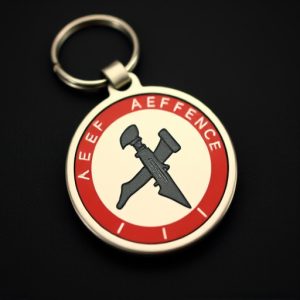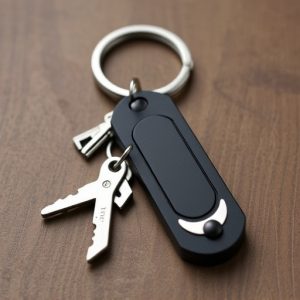Legal Guide: Carry a Self-Defense Keychain Safely Within State Laws
In the U.S., laws concerning compact keychain weapon accessories (CKWAs) differ significantly from s…….
In the U.S., laws concerning compact keychain weapon accessories (CKWAs) differ significantly from state to state, making it essential for individuals considering self-defense tools to understand their local regulations. These laws cover sale, possession, and use of items like mini pepper sprays, stun guns, and pocket knives, with age restrictions, permit requirements, and rules for open or concealed carry. Staying informed about these legal requirements is crucial for compliance, safety, and responsible use of CKWAs. Users must learn proper storage, deployment techniques, and local laws to ensure ethical handling and mitigate risks.
“Uncover the legal aspects of carrying self-defense keychain weapons with our comprehensive guide. In many states, compact keychain accessories designed for personal safety are regulated by specific laws. Understanding these regulations is essential before you consider adding a self-defense keychain to your routine.
From state-by-state guidelines to permit requirements and safety training, this article navigates the legal landscape of compact keychain weapon accessories, empowering you with knowledge.”
- Understanding State Laws Regulating Compact Keychain Weapons
- Legal Requirements for Carrying a Self-Defense Keychain
- Permits and Licenses: What You Need to Know
- Limitations and Prohibitions: Common Restrictions
- Safety and Training: Responsibilities of Owners
Understanding State Laws Regulating Compact Keychain Weapons
In the United States, the legal landscape surrounding compact keychain weapons and their accessories varies significantly from state to state. Understanding these laws is crucial for anyone considering carrying a self-defense tool on their keys. Each state has its own set of regulations governing the sale, possession, and use of compact keychain weapon accessories, such as mini pepper sprays, stun guns, or pocket knives designed for personal protection. These laws may dictate age restrictions, permit requirements, and even places where these devices can be carried openly or concealed.
To ensure compliance, individuals must familiarize themselves with the specific regulations in their respective states. Some states have more liberal laws allowing open carry without a permit, while others require permits or registration for certain types of compact keychain weapons. Still, others may restrict or ban altogether the possession and carrying of such devices. Staying informed about these legal requirements is essential to avoid legal repercussions and ensure the safe and responsible use of self-defense keychain accessories.
Legal Requirements for Carrying a Self-Defense Keychain
When considering carrying a compact keychain weapon for self-defense, understanding the legal requirements is paramount. The legality of such devices varies significantly across states and jurisdictions. Some areas allow them with specific restrictions, while others have strict regulations or outright ban them. It’s crucial to research and comply with local laws before purchasing or carrying any type of self-defense accessory, including compact keychain weapons.
Keychain weapon accessories must meet certain criteria to be considered legal. This often includes limitations on the type and size of the device, as well as restrictions on where and how it can be used. Some states require permits for certain types of self-defense tools, while others have specific rules about carrying them in public spaces or near schools and government buildings. Being aware of these requirements ensures not only legal compliance but also personal safety.
Permits and Licenses: What You Need to Know
When considering carrying a compact keychain weapon for self-defense, one of the first things to understand is the legal landscape surrounding permits and licenses. Many states in the US have specific regulations regarding the open or concealed carry of such devices, often referred to as Compact Keychain Weapon Accessories (CKWAs). Some states require a permit or license for CKWAs, while others do not. It’s crucial to know your state’s laws before making the decision to purchase and carry one of these devices.
Permits and licenses are typically issued by local or state law enforcement agencies and often come with specific conditions and restrictions. These may include age requirements, background checks, training certifications, and even limitations on where and how you can legally use your self-defense accessory. Understanding these legal requirements is essential to ensure compliance and avoid potential penalties or legal issues.
Limitations and Prohibitions: Common Restrictions
Despite their compact nature, compact keychain weapon accessories do come with limitations and legal restrictions that vary widely across different states. While many states allow certain types of self-defense tools like pepper spray or tactical flashlights, there are often prohibitions on the type, size, and capacity of devices permitted. Some states have specific restrictions on who can possess these items—for instance, only allowing them to be carried by individuals with a valid concealed carry permit.
Prohibited items can include certain types of knives, stun guns, or any device that could be used as a weapon and is deemed too dangerous for public carrying. Even within permissible categories, there are often limits on the amount an individual can possess. It’s crucial to understand these limitations to ensure compliance with local laws, avoiding potential legal issues, and ensuring personal safety while utilizing compact keychain weapon accessories.
Safety and Training: Responsibilities of Owners
The safety and responsible handling of compact keychain weapon accessories are paramount for their effective use in self-defense scenarios. Owners bear a significant responsibility to ensure these tiny yet potent tools do not cause harm unintentionally. Proper training is essential; users must learn safe storage, deployment techniques, and awareness of local laws regarding self-defense weapons. Regular practice can help individuals become proficient, minimizing the risk of accidental discharge or misuse.
Keychain weapon accessories are designed for personal safety in situations where one might feel vulnerable, but their use should be a last resort. Owners must commit to continuous learning and adhere to legal guidelines, ensuring they understand when and how to deploy these tools ethically and legally. This includes staying informed about the specific regulations in their state regarding self-defense keychain weapons, as laws vary widely across regions.
When considering a compact keychain weapon for self-defense, it’s crucial to understand the legal requirements and safety responsibilities outlined in your state’s regulations. From permit systems to limitations on use, each state has its own set of rules governing these small but potent accessories. By staying informed about the legal landscape, you can ensure compliance while gaining peace of mind knowing you’re prepared. Remember, proper training and adherence to local laws are essential when carrying a compact keychain weapon for self-defense.


